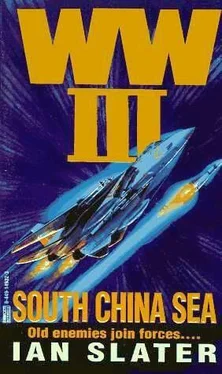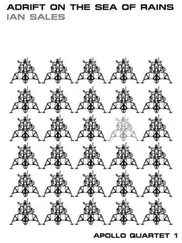The fact was that whether the White House had known this or not, the T-AGOS 1, normally operated by the Military Sealift Command, was clearly sailing under a U.N. and not a U.S. flag. For the first time in many years, an old and hitherto firmly held assumption that the U.S. would at all times know precisely where all non-U.S. submarines were and would know what countries the subs belonged to was proven to be wrong.
Hit amidships, the T-AGOS 1 never stood a chance, the enormous implosion of water sending her down in minutes, with only three of her complement, one Japanese observer and two American seamen, surviving.
* * *
Presidential adviser Ellman, the White House’s point man on damage control, was now on the “Larry King Show,” trying to explain why, if the President knew that a T-AGOS 1 was a spy ship, it was used in the first place. Or was the civilian-manned ship used because its maximum speed-from eleven to thirteen knots — was relatively so slow that the President hoped that by the time it reached Hanoi’s port of Haiphong the China-Vietnam clash would be over? In short, King wanted to know, was it a cynical, vote-getting political move on the part of the administration for the White House to look decisive while hoping time would cool Vietnamese and Chinese tempers?
“No, certainly not,” Ellman replied. “It was a U.S. ship that had the kind of sophisticated communications gear the U.N. would need to monitor the situation and report back to its headquarters. Also, in view of Japan’s reluctance to become too involved with the situation, it was the best available vessel.”
“You know what I think?” the first phone-in caller began.
“No,” King said. “You have a question for Mr. Ellman?”
“Well, I think you people at the White House knew what the hell it was. You just told the President what the Pentagon told you, and the Pentagon — am I still on?”
“Yes,” King said. “Hurry it up, ma’am.”
“I am hurrying it up. I think the Pentagon didn’t tell the President it was a spy ship because the hawks over there want to get us in another fight. Reminds me of the Gulf of Tonkin—”
“Sorry, ma’am,” King said, cutting her off. “Time’s up.” He turned to Ellman. “Well, how about it, Bruce? Did the Pentagon come clean? Do the hawks want a fight?”
Ellman was either shocked or good at affecting it. “I don’t know of anyone, hawk or dove, who wants a ‘fight,’ as the lady put it.”
“But you knew it was a spy ship — right?”
It was Ellman’s face turning a salmon-pink that gave him away. “We, ah — we were informed that an American communications ship was, er, ah — available.”
King and millions of viewers were on to it. “You didn’t know it was a spy ship?”
“Not at the time.”
“Well, when did you know?”
“Ah, I can’t recall exactly, but—”
“After or before the ship was sunk?”
Viewers could see Ellman exhale, almost in relief.
“After. The President certainly didn’t. The President didn’t — I mean it was the Pentagon — to be more exact, it was, I believe, the job of the MSC—”
“What’s that?” King cut in.
“The, ah, Military Sealift Command.”
“So you didn’t know—”
“Not until later.”
“After it was sunk.”
“Ah — yes. That’s right.”
The second caller was irate. “I’ve been waiting half an hour—”
“Your wait’s over, sir,” King told him. “What’s the question?”
“You guys in the media make me sick. You’re tryin’ to make it look like the President’s fault. How about who started it? First we lose, what, twelve Americans on that oil drill ship, and now we lose a whole crew. How many I don’t know. What we should be asking is what are we gonna do about it? Sit on our fannies while some Korean egomaniac—”
“We don’t know it was a Korean sub that hit it.” King turned to Ellman. “There was some talk of the possibility of a mine.”
“Ah, mine, shine,” the caller said. “What’s the difference? We got Americans dead all over the place, and you guys in Washington are doing nothing but talking. We’ve got to let these tin-pot dictators—”
“Out of time, sir. Have to move on. Good question, though, Bruce. What’s the U.S. response going to be now?”
“Well, the Joint Chiefs’ll be meeting with the President this evening.”
“Uh-huh. But you know, Bruce, we’ve had a couple of good questions here tonight. Isn’t there a larger picture here? I mean, let’s see…” King picked up a news clipping. “New York Times asks, ‘What kind of message is our apparent inaction sending worldwide?’ And you know the Times was one of the papers to advise caution in the first instance — in the, uh, Chical business.”
Ellman was visibly relieved. “And that’s exactly what the administration is doing.”
“Yeah, but that was in the first instance. Now it and — well, you just heard from the callers — a lot of people — I should say, a lot of Americans— are asking, What are we going to do now that the T-AGOS 1 has been sunk?”
“We’ll still move with caution. This administration isn’t about to commit the lives of young Americans without duly—”
“ ‘Scuse me, Bruce, but isn’t the point this — that you are now being criticized for precisely the kind of thing you people criticized the previous administration for—”
“No, I don’t think we—”
“Sorry,” King cut in, “but we didn’t clear one point up. How many Americans have now died in this sinking and the attack by whoever it was on the Chical —wasn’t it Chical?’
“Yes…”
“Yeah, and on the Chical drill ship?”
“Forty-one, I believe. But Larry, let me just say something here. We’ve already ordered the Seventh Fleet into the general area, but we still don’t know who it was that attacked the drill ship or — and I must emphasize this — or the T-AGOS 1.”
“I understand, but isn’t it a bit late for who started what? I mean, China has invaded Vietnam. And everyone — and by that I mean mainly the other countries — is disputing these oil-rich islands. Who are the others, by the way — besides China and Vietnam?”
“Indonesia, the Philippines, Malaysia, Brunei,” Ellman replied.
“Well,” King continued, “isn’t the danger here that if we — the United States — don’t make up our minds quickly on that, that all these countries could be at war? The South China Seas trade route to Japan and the U.S. could be a war zone.”
“I, ah — possibly. That’s why I think it’s prudent to be careful.”
“Nobody’s denying prudence, Bruce, but isn’t it true that the longer we wait, the more the danger of it spreading? I mean this war between Vietnam and China.”
“I think it’s more likely that the other countries will want to see which way the wind blows.”
“You mean go with whoever wins the war?”
“Possibly.”
“All right — last caller. From Oklahoma.”
It was a woman’s voice, strangled by sobs. “My husband is one of those missing in the Chical attack — I mean, the attack on the Chical… ”
There was a long pause.
“Take your time, ma’am.”
“He’s one of those missing…. He fought in Vietnam…. His sisters served. They were lost. He was decorated twice. I just want to know, is Washington doing anything to—” She couldn’t finish.
“Bruce.” King’s tone was more solemn now. “What do we tell this lady? Is there a possibility that Americans may have to fight again in Vietnam, only this time with Vietnamese to repel China?”
Читать дальше












